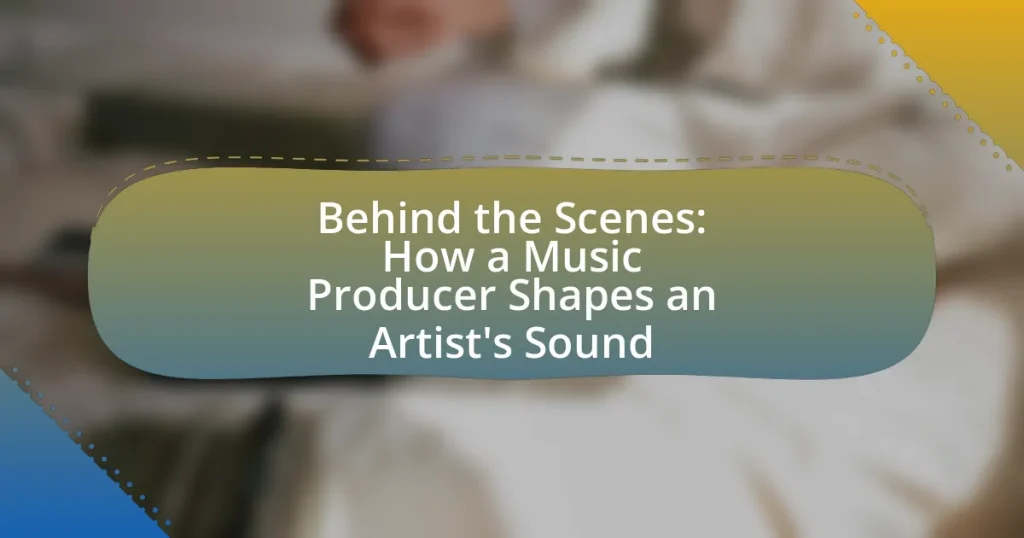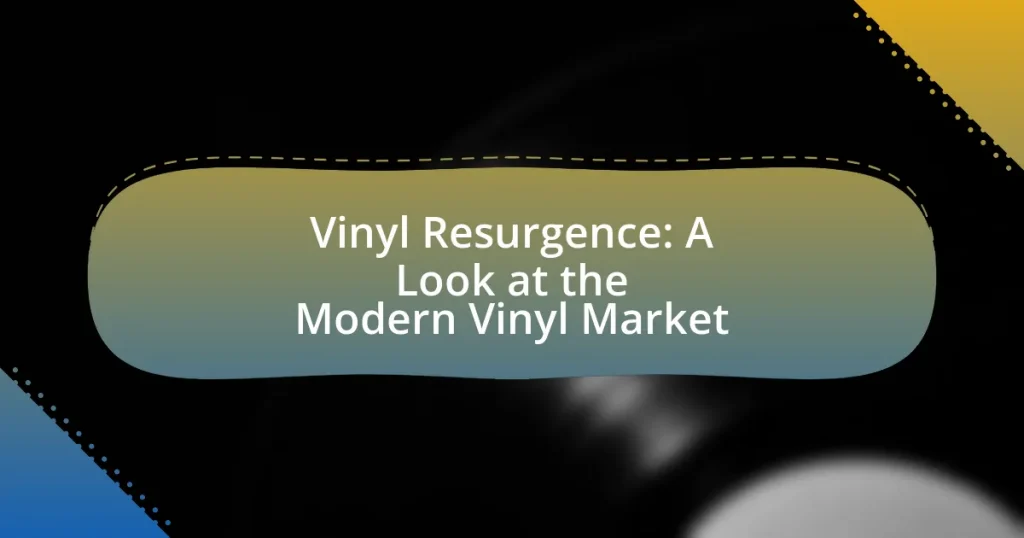The article “Behind the Scenes: How a Music Producer Shapes an Artist’s Sound” examines the pivotal role of music producers in the recording process and their influence on an artist’s sound and creative direction. It highlights the collaborative relationship between producers and artists, detailing key responsibilities such as overseeing recording sessions, managing technical aspects, and making critical decisions on arrangements and instrumentation. The article also discusses essential skills for producers, the impact of trust in the producer-artist relationship, and the challenges faced in music production, providing insights into best practices for aspiring producers and the resources available for learning production techniques.
What is the role of a music producer in shaping an artist’s sound?
A music producer plays a crucial role in shaping an artist’s sound by overseeing the recording process, guiding the artistic direction, and making critical decisions about arrangements, instrumentation, and production techniques. This involves collaborating closely with the artist to refine their vision and enhance their musical identity. For instance, producers like Rick Rubin and Quincy Jones have been known to significantly influence the sound of artists by introducing innovative elements and ensuring high production quality, which can lead to commercial success and critical acclaim.
How does a music producer collaborate with an artist?
A music producer collaborates with an artist by guiding the creative process, shaping the sound, and overseeing the recording sessions. This collaboration involves discussing the artist’s vision, selecting songs, arranging music, and providing feedback on performances. Producers often utilize their technical skills to enhance the quality of recordings, employing various techniques such as mixing and mastering to achieve the desired sound. For instance, renowned producer Rick Rubin has worked with diverse artists, adapting his approach to fit their unique styles, which demonstrates the importance of flexibility and understanding in the producer-artist relationship.
What are the key responsibilities of a music producer during the recording process?
A music producer’s key responsibilities during the recording process include overseeing the recording sessions, managing the technical aspects of sound, and guiding the artistic direction of the project. The producer collaborates with artists and engineers to ensure that the desired sound is achieved, making decisions on arrangements, instrumentation, and vocal performances. Additionally, the producer is responsible for maintaining the budget and schedule of the recording sessions, ensuring that the project stays on track. This role is critical as it directly influences the final sound and quality of the music produced, which can impact its commercial success.
How does a producer influence an artist’s creative direction?
A producer influences an artist’s creative direction by shaping the overall sound, arrangement, and production techniques used in a project. Producers often collaborate closely with artists to refine their vision, suggesting changes to melodies, lyrics, and instrumentation that align with current trends or the artist’s goals. For example, producers like Rick Rubin have been known to encourage artists to explore different genres or styles, leading to innovative sounds that redefine their music. This collaborative process can significantly impact the final product, as the producer’s expertise in sound engineering and market knowledge helps to create a polished and commercially viable outcome.
What skills are essential for a music producer?
Essential skills for a music producer include technical proficiency in audio engineering, creativity in music composition, strong communication abilities, and project management skills. Technical proficiency allows producers to operate recording equipment and software effectively, ensuring high-quality sound production. Creativity is crucial for developing unique musical ideas and arrangements that enhance an artist’s vision. Strong communication skills facilitate collaboration with artists, musicians, and other industry professionals, ensuring that everyone is aligned on the project’s goals. Project management skills are necessary to oversee the production process, manage timelines, and coordinate resources efficiently. These skills collectively enable a music producer to shape an artist’s sound effectively and deliver polished final products.
How does technical knowledge impact a producer’s effectiveness?
Technical knowledge significantly enhances a producer’s effectiveness by enabling them to make informed decisions about sound quality, equipment usage, and production techniques. This expertise allows producers to optimize recording sessions, troubleshoot technical issues, and implement advanced audio processing methods, ultimately leading to a polished final product. For instance, a study by the Berklee College of Music found that producers with strong technical skills can reduce recording time by up to 30%, demonstrating that technical proficiency directly correlates with efficiency and quality in music production.
What interpersonal skills are crucial for successful collaboration?
Effective communication, active listening, and emotional intelligence are crucial interpersonal skills for successful collaboration. Effective communication ensures that all team members clearly convey their ideas and feedback, which is essential in a creative environment like music production. Active listening allows individuals to understand and appreciate different perspectives, fostering a collaborative atmosphere. Emotional intelligence helps team members navigate interpersonal dynamics, manage conflicts, and build strong relationships, which are vital for a cohesive working environment. These skills collectively enhance teamwork and creativity, leading to better outcomes in music production.
Why is the producer-artist relationship important?
The producer-artist relationship is important because it directly influences the quality and direction of the music created. Producers bring technical expertise, creative vision, and industry knowledge that can enhance an artist’s sound and help realize their artistic goals. For instance, a study by the Berklee College of Music found that effective collaboration between producers and artists often leads to higher-quality recordings and greater commercial success. This relationship fosters an environment where artists can experiment and innovate, ultimately shaping their musical identity and career trajectory.
How does trust between a producer and an artist affect the final sound?
Trust between a producer and an artist significantly enhances the final sound by fostering open communication and creative collaboration. When artists feel secure in their relationship with producers, they are more likely to experiment with their sound, take risks, and express their artistic vision without fear of judgment. This dynamic leads to a more authentic and cohesive musical product. For instance, studies have shown that successful collaborations often stem from mutual respect and understanding, which can result in innovative soundscapes that resonate more deeply with audiences.
What are the long-term impacts of a strong producer-artist partnership?
A strong producer-artist partnership leads to sustained artistic growth and commercial success for the artist. This collaboration often results in a distinctive sound that becomes synonymous with the artist’s brand, enhancing their marketability. For instance, the partnership between producer Rick Rubin and artist Johnny Cash revitalized Cash’s career in the late 1990s, leading to critically acclaimed albums that introduced him to a new generation of listeners. Additionally, such partnerships can foster innovation, as producers bring technical expertise and creative vision that challenge artists to explore new musical directions. This dynamic can lead to a more extensive discography and a loyal fan base, ultimately contributing to the artist’s longevity in the industry.
How do music producers adapt to different genres?
Music producers adapt to different genres by understanding the unique characteristics and conventions of each style, allowing them to tailor their production techniques accordingly. For instance, a producer working in hip-hop may focus on beat-making and sampling, while one in classical music emphasizes orchestration and arrangement. This adaptability is supported by their knowledge of genre-specific instrumentation, production software, and mixing techniques, which vary significantly across genres. Additionally, successful producers often collaborate with artists to ensure that the final sound aligns with the expectations of the genre, thereby enhancing the overall authenticity and appeal of the music.
What techniques do producers use to tailor sound to specific genres?
Producers use various techniques to tailor sound to specific genres, including instrumentation selection, arrangement, mixing techniques, and effects processing. For instance, in electronic music, producers often utilize synthesizers and drum machines to create distinctive sounds, while in rock, they may focus on live instruments like guitars and drums. Additionally, arrangement techniques such as verse-chorus structure are genre-specific; pop music often follows a formulaic structure to enhance catchiness. Mixing techniques also vary; for example, hip-hop producers may emphasize bass frequencies, while jazz producers might prioritize clarity and dynamic range. Effects processing, such as reverb and delay, is applied differently across genres to achieve the desired atmosphere, with ambient music often using extensive reverb to create space. These methods are grounded in the characteristics that define each genre, ensuring that the final product resonates with its intended audience.
How does genre influence the choice of production tools and methods?
Genre significantly influences the choice of production tools and methods by dictating the sonic characteristics and stylistic elements that producers aim to achieve. For instance, electronic genres often utilize digital audio workstations (DAWs) and synthesizers to create unique sounds, while acoustic genres may rely on traditional instruments and analog recording techniques to capture a more organic feel. The choice of tools is further supported by the fact that different genres have established conventions; for example, hip-hop production frequently incorporates sampling and beat-making software, while rock music production might prioritize live instrument recording and mixing techniques that emphasize dynamic range. This alignment between genre and production methods ensures that the final sound aligns with listener expectations and industry standards.
What are the common challenges faced by music producers?
Music producers commonly face challenges such as managing creative differences, budget constraints, and tight deadlines. Creative differences often arise between producers and artists regarding the direction of a project, which can lead to conflicts that hinder progress. Budget constraints limit the resources available for recording, mixing, and marketing, impacting the overall quality of the final product. Additionally, tight deadlines can pressure producers to deliver high-quality work quickly, often resulting in stress and potential compromises in the creative process. These challenges are well-documented in industry reports, highlighting the complexities of the music production landscape.
How do producers handle creative differences with artists?
Producers handle creative differences with artists by facilitating open communication and collaboration. They often encourage artists to express their ideas while providing constructive feedback to align visions. For instance, successful producers like Rick Rubin have been known to create a comfortable environment where artists feel safe to explore their creativity, which helps in resolving conflicts. Additionally, producers may suggest compromises or alternative approaches that maintain the integrity of the artist’s vision while incorporating their own expertise, ultimately leading to a cohesive final product. This method is supported by the fact that many hit records are the result of collaborative efforts where both parties contribute to the creative process.
What strategies can producers use to overcome technical obstacles?
Producers can use several strategies to overcome technical obstacles, including investing in high-quality equipment, utilizing software tools for sound editing, and collaborating with skilled technicians. High-quality equipment ensures better sound capture and reduces issues related to audio fidelity. Software tools, such as digital audio workstations (DAWs), provide advanced features for editing and mixing, allowing producers to address technical challenges efficiently. Collaboration with skilled technicians can also enhance problem-solving capabilities, as they bring specialized knowledge to troubleshoot and resolve technical issues effectively. These strategies are essential for maintaining sound quality and achieving the desired artistic vision in music production.
What are the best practices for aspiring music producers?
Aspiring music producers should focus on developing technical skills, understanding music theory, and building a diverse portfolio. Technical skills, such as proficiency in digital audio workstations (DAWs) like Ableton Live or Pro Tools, are essential for effective music production. Understanding music theory helps producers create harmonically rich compositions and arrangements. Building a diverse portfolio showcases versatility and attracts potential clients or collaborators. According to a survey by Sound on Sound, 70% of successful producers emphasize continuous learning and experimentation as key to their growth.
How can new producers build effective networks in the music industry?
New producers can build effective networks in the music industry by actively engaging with industry professionals through events, social media, and collaborations. Attending music conferences, workshops, and local shows allows producers to meet artists, managers, and other producers, fostering relationships that can lead to future opportunities. Utilizing platforms like LinkedIn and Instagram enables producers to showcase their work and connect with influential figures in the industry. Collaborating with emerging artists not only enhances a producer’s portfolio but also expands their reach within the community. According to a study by the Berklee College of Music, networking is crucial for career advancement in the music industry, as 70% of jobs are found through personal connections.
What resources are available for learning production techniques?
Online courses, textbooks, and tutorials are key resources for learning production techniques. Platforms like Coursera, Udemy, and MasterClass offer structured courses taught by industry professionals, covering various aspects of music production. Additionally, textbooks such as “The Mixing Engineer’s Handbook” by Bobby Owsinski provide in-depth knowledge on mixing techniques. YouTube channels dedicated to music production, like Produce Like A Pro and Point Blank Music School, offer free tutorials that demonstrate practical skills and techniques. These resources collectively equip learners with both theoretical knowledge and practical skills essential for mastering production techniques.















